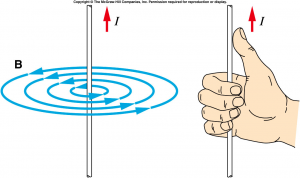Magnetism: Difference between revisions
No edit summary |
No edit summary |
||
| Line 50: | Line 50: | ||
<math> | <math> | ||
d \vec{l} = dz \hat{k} + d \rho \hat{\rho} + \rho d \phi \hat{e_\phi} | d \vec{l} = dz \hat{k} + d \rho \hat{\rho} + \rho d \phi \hat{e_\phi} | ||
</math> | </math> | ||
Revision as of 21:27, 1 March 2024
Magnetic Field
A moving charge causes a magnetic field, following the right hand rule: Your thumb pointing towards the direction of movement of the positive charge, and your other fingers wrap around to indicate the direction of the magnetic field.
A circulating current forms a magnetic dipole.
Calculate Field

Where is magnetic permeability, and is distance from the wire.
Any component going along the direction of current is cancelled by cross product. Something else. Therefore, it is unsurprising that magnetic field is circulating.
Special Field: Wire
- TODO: Later fill out <01-03-24, xydxydxyd1> -
Loops
Let there be a loop of current flowing clockwise. The magnetic field inside the loop is always going out of the page, whereas the field outside always go into the page.
This can be proven by considering each single length of wire. The shape of the loop does not matter.
Ampere's Law of Magnetic field
Consider a very long wire, with curve C around the wire. There is
where is the direction of the wire, is the direction away from the wire, and is the direction tangential to the wire.









